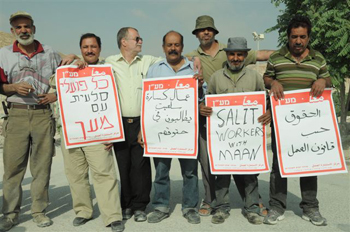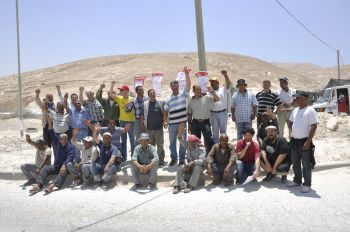For 27 years, since Salit Quarries began operating in the occupied West Bank under the ownership of Jews from Jerusalem, it has employed Palestinian workers from the West Bank and East Jerusalem. Though quarrying sand and gravel from the desert Mountains just 10 km east of Jerusalem has brought considerable profit to the owners, the workers have been employed under exploitative terms and with insufficient safety standards. Until the workers began organizing with WAC (in May 2007), the West Bank workers were employed without pay slips and without pension insurance. No tests had been carried out to ascertain the affect of the dust on the workers’ health, and there were no facilities such as a dining room, washrooms or water cooler though the quarry is located in an isolated arid region. (http://www.wac-maan.org.il/en/article__38/palestinian_quarry_workers_organize) Following claims and pressure from WAC and the workers, the quarry agreed to some improvements.
In October 2009, the organizing campaign of WAC was completed, and together the workers and the union compelled the management to allow elections for a workers’ committee
(http://www.wacmaan.org.il/en/article__132/salit_quarry_workers_make_history_%3Cbr%3Eworkers_committee_elected_after_25_years).
A month later, negotiations towards a collective agreement commenced between representatives of the quarry management, WAC, and the workers’ committee. Negotiations continued for a year and a half, in the midst of it the management withdrew from the negotiating table and forced the union to announce a strike of 4 days in May 2010. (http://www.wac-maan.org.il/en/article__153/the_salit_quarry_workers_in_the_occupied_west_bank_have_gone_on_strike_until_management_agrees_to_sit_down_with_them_and_negotiate_a_collective_agreement) The strike ended when the management sent a letter that promised an intensive negotiations towards an agreement.
Following the resumption of the negotiations and not without difficulties the union and the workers went step by step in almost 10 months of meetings until an agreement was reached. On 10th of April 2011, a draft agreement was drawn up by the negotiating teams and a date for the signing of the agreement was set. The union went through the motions of its rules that oblige an agreement to be approved by the general assembly of the members of the union who are affected by the agreement. On April 12th 2011 the draft agreement (translated by WAC to Arabic) was brought to the workers’ general assembly, where it was approved by a decisive majority of the workers. A small minority of workers on a higher wage scale claimed the agreement was inadequate and voted against.
Faced with the agreement of the workers and their union to the draft it was expected that the management will proceed with what had been agreed and sign the agreement on May 2nd as planned. However reality was different. Although disagreements had been ironed out, the management still refused to sign the agreement it reached with the workers’ representatives. For two months the management repeatedly postponed the date which had been set for the signing. When WAC warned on May 15 that if the postponements continued it would lead to a labor dispute, the management didn’t even bother to respond. Telephone calls made to clarify the situation were met with technical excuses.
On May 23, WAC declared a labor dispute. As required by law, a notice was left with the management for 15 days, so that a solution could be found and the strike prevented. In a letter from June 2nd, the management requested that WAC grant it an additional six days. It said that a decisive meeting would be held on June 16 that would determine the date for signing the collective agreement.
In light of this assurance, and in light of the fact that the workers salaries had been paid on time this time (in the last several months the management made it a habit to be late with the workers salaries), WAC and the workers agreed to postpone the strike. However, three days before the date, the quarry manager called WAC to say the “decisive meeting” had been postponed yet again.
In response to this the union called an urgent meeting of the workers in the Quarry on June 15 at 13.00 – meaning in the middle of the work day. The aim of the meeting was to discuss with the workers how they should respond to the postponement, for which no explanation was offered. The workers, tired of the management’s maneuvers, unanimously demanded that a general and unlimited strike would be declared until the agreement be signed.
Photo by: Noam Frankfurter
When the management understood the workers were determined to strike, it began calling the workers to try to persuade them to change their minds. The quarry overtly avoided getting in touch with the negotiating team of WAC and used all means to put pressure on the workers to cancel the strike behind the back of the union. In fact, the quarry here revealed its true intentions which explain its tactics during a year and a half of negotiations: relentless negotiations over every small point to procrastinate and to show the workers that WAC can’t help them achieve anything and thus to convince them it would be better for them to leave the union. This method of duplicity and lies was used to break the workers unity and their support for the union. It is a policy that runs contrary to the management’s obligation to negotiate in good faith with the workers’ representatives.
The workers rejected this attempt to cheat them. They are totally behind their union. The workers made it clear they are determined not to give in to such methods, more characteristic of mafia than management in negotiations with its workers. WAC is aware that the union of Salit workers is the first attempt to organize Palestinian workers employed on the premises of Israeli settlements in the West Bank. These workers, to whom their place of work is essential, will not strike recklessly. As long as they had even a sliver of faith that an agreement could be reached, they preferred to continue negotiating and restrain themselves in the face of endless obstacles and provocations. However, now it has been proved beyond all doubt that the reason for the delays was not economic hardship as the quarry claimed, but its perverse attempt to break the union.
The workers are united with WAC and will continue their strike until the agreement is officially signed. In accordance with recommendations from WAC’s negotiating team, the workers declared that the management’s promises are not to be trusted. Even if negotiations are recommenced, the strike will continue. The position of WAC is clear: no work will be carried out at the quarry without an agreement. The workers swore on the first day of the strike that they would no longer be slaves to a management that shows them no respect.




